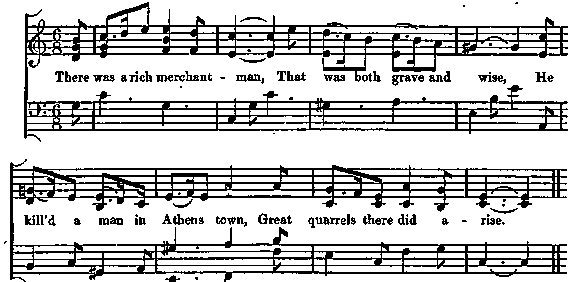Popular Music Of The Olden Time Vol 1
Ancient Songs, Ballads, & Dance Tunes, Sheet Music & Lyrics - online book
| Share page | Visit Us On FB |
|
|
||
|
382 ENGLISH SONG AND BALLAD MUSIC. |
||
|
|
||
|
(See Old Ballads, i. 28,1810.) It is parodied in act iii. of Rowley's comedy, A new Wonder, a Woman never vext, 1632; and quoted in The Triumphant Widow, 1677 :—
" There was a rich merchant man, He kill'd a man in Athens town,
That was both, great and wise, Great quarrels there did arise," &c.
A rich Merchantman is one of the tunes to a song in The Famous Historie of Fryer Bacon, b.l., 4to, n.d.; and There was a rich Merchantman to a ballad in the Pepys Collection, ii. 190. Others (under the one name or the other) will be found in the Roxburghe Collection, i. 286 and 444, ii. 242, &c. |
||
|
|
||
 |
||
|
|
||
|
FAIR MARGARET AND SWEET WILLIAM.
Copies of this ballad are in the Douce Collection, fol. 72, and in the Collection of Mr. George Daniel; also in Percy's Heliques of Ancient Poetry.
Percy says, " This seems to be the old song quoted in Fletcher's Knight of the Burning Pestle, acts ii. and iii.; although the six lines there preserved are somewhat different from those in the ballad as it stands at present. The lines preserved in the play are this distich:—
" You are no love for me, Margaret, I am no love for you;" and the following stanza:— " When all was grown to dark midnight, In came Margaret's grimly ghost,
And all were fast asleep, And stood at William's feet."
Percy adds that " these lines have acquired an importance by giving birth to one of the most beautiful ballads in our own or any other language "—" Margaret's Ghost" by Mallet.
Mallet's ballad attained deserved popularity. It was printed in various forms
^n half-sheets with music, and in Watts' Musical Miscellany, ii. 84, 1729. The
air became known by its name, and is so published in The Village Opera, 1729,
and in Tlie Devil to pay, 1731.
It was not, however, printed exclusively to this tune. Thomson published it |
||
|
|
||